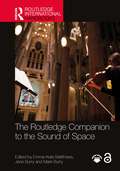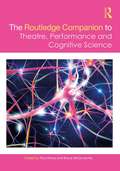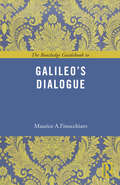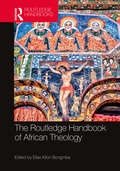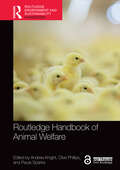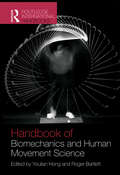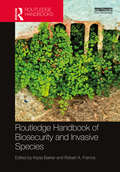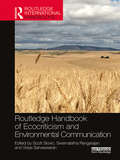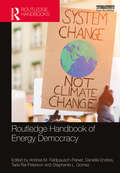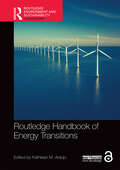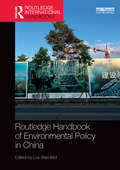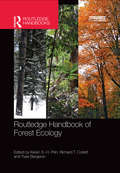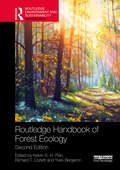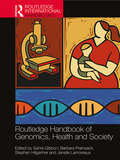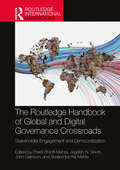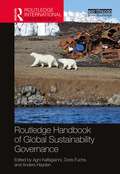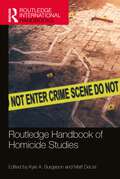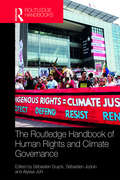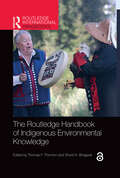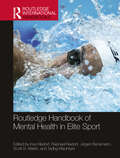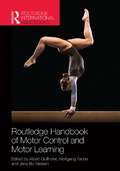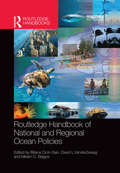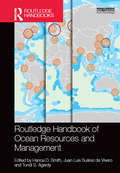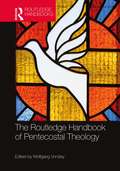- Table View
- List View
The Routledge Companion to the Sound of Space (Routledge International Handbooks)
by Emma-Kate Matthews Jane Burry Mark Burry Pantea Alambeigi Sven Anderson Paul Bavister Zackery Belanger David Buck Paul Carter Philip Coleman John Levack Drever Sasha Elina Stuart Favilla’s Iain Forsyth & Jane Pollard Michael Fowler Raviv Ganchrow Nina Garthwaite Lawrence Harvey Philip Jackson Ildar Khannanov Emil Kraugerud Jordan Lacey Jeff Malpas Emma Margetson Fabricio Mattos Angela McArthur Ben McDonnell Wes McGee Carla Molinari Shane Myrbeck Catie Newell Pedro Novo Gascia Ouzounian Eleni-Ira Panourgia Rosalind Parker Raj Patel Philip Samartzis Gerriet K. Sharma Mark Taylor David Toop Jonathan Tyrrell Gerrie Van Noord Cobi Van Tonder Jan St. Werner Sipei ZhaoThis companion explores a range of conceptual and practical relationships between sound and space across various disciplines, providing insights from technical, creative, cultural, political, philosophical, psychological, and physiological perspectives. The content spans a wide range of spatial typologies, from large reverberant buildings to modest and intimate ones, from external public squares to domestic interiors, and from naturally formed environments to highly engineered spaces. These compiled insights and observations explore the vast diversity of ways in which sonic and spatial realms interact.This publication therefore forms important bridges between the intricate and diverse topics of technology, philosophy, composition, performance, and spatial design, to contemplate the potential of sound and space as tools for creative expression and communication, as well as for technical innovation. It is hoped that by sharing these insights, this book will inspire practitioners, scholars, and enthusiasts to incorporate new perspectives and methodologies into their own work.Through a rich blend of theory, practice, and critical reflection, this volume serves as a valuable resource for anyone interested in exploring the intricacy of relationships between space and sound, whether they are students, professionals, or simply curious. Our companion provides a cross-section through shared territories between sonic and spatial disciplines from architecture, engineering, sound design, music composition and performance, urban design, product design, and much more.
The Routledge Companion to Theatre, Performance and Cognitive Science (Routledge Companions)
by Rick Kemp Bruce McConachieThe Routledge Companion to Theatre, Performance and Cognitive Science integrates key findings from the cognitive sciences (cognitive psychology, neuroscience, evolutionary studies and relevant social sciences) with insights from theatre and performance studies. This rapidly expanding interdisciplinary field dynamically advances critical and theoretical knowledge, as well as driving innovation in practice. The anthology includes 30 specially commissioned chapters, many written by authors who have been at the cutting-edge of research and practice in the field over the last 15 years. These authors offer many empirical answers to four significant questions: How can performances in theatre, dance and other media achieve more emotional and social impact? How can we become more adept teachers and learners of performance both within and outside of classrooms? What can the cognitive sciences reveal about the nature of drama and human nature in general? How can knowledge transfer, from a synthesis of science and performance, assist professionals such as nurses, care-givers, therapists and emergency workers in their jobs? A wide-ranging and authoritative guide, The Routledge Companion to Theatre, Performance and Cognitive Science is an accessible tool for not only students, but practitioners and researchers in the arts and sciences as well.
The Routledge Guidebook to Galileo's Dialogue: Routledge Guidebook To Galileo's Dialogue (The Routledge Guides to the Great Books)
by Maurice A. FinocchiaroThe publication in 1632 of Galileo’s Dialogue on the Two Chief World Systems, Ptolemaic and Copernican marked a crucial moment in the ‘scientific revolution’ and helped Galileo become the ‘father of modern science’. The Dialogue contains Galileo’s mature synthesis of astronomy, physics, and methodology, and a critical confirmation of Copernicus’s hypothesis of the earth’s motion. However, the book also led Galileo to stand trial with the Inquisition, in what became known as ‘the greatest scandal in Christendom’.In The Routledge Guidebook to Galileo's Dialogue, Maurice A. Finocchiaro introduces and analyzes: the intellectual background and historical context of the Copernican controversy and Inquisition trial; the key arguments and critiques that Galileo presents on both sides of the ‘dialogue’; the Dialogue’s content and significance from three special points of view: science, methodology, and rhetoric; the enduring legacy of the Dialogue and the ongoing application of its approach to other areas. This is an essential introduction for all students of science, philosophy, history, and religion wanting a useful guide to Galileo’s great classic.
The Routledge Handbook of African Theology (Routledge Handbooks in Theology)
by Elias Kifon BongmbaTheology has a rich tradition across the African continent, and has taken myriad directions since Christianity first arrived on its shores. This handbook charts both historical developments and contemporary issues in the formation and application of theologies across the member countries of the African Union. Written by a panel of expert international contributors, chapters firstly cover the various methodologies needed to carry out such a survey. Various theological movements and themes are then discussed, as well as biblical and doctrinal issues pertinent to African theology. Subjects addressed include: • Orality and theology • Indigenous religions and theology • Patristics • Pentecostalism • Liberation theology • Black theology • Social justice • Sexuality and theology • Environmental theology • Christology • Eschatology • The Hebrew Bible and the New Testament The Routledge Handbook of African Theology is an authoritative and comprehensive survey of the theological landscape of Africa. As such, it will be a hugely useful volume to any scholar interested in African religious dynamics, as well as academics of Theology or Biblical Studies in an African context.
Routledge Handbook of Animal Welfare (Routledge Environment and Sustainability Handbooks)
by Andrew Knight, Clive Phillips, and Paula SparksThis handbook presents a much-needed and comprehensive exploration of the rapidly growing fields of animal welfare and law. In recent years there has been increasing attention paid to our complex, multifaceted relationships with other animals, and in particular, the depth and breadth of various societal uses of animals. This has led to a reconsideration of their moral and social status, which has sometimes challenged the interests of those who use animals. In such a contested domain, sound evidence and reasoning become particularly important. Through firm commitment to such principles, this book explores the biological foundations for the moral consideration of animals and for evolving conceptualisations of animal welfare. It reviews in detail the welfare concerns associated with numerous forms of animal use. The inclusion of key recent developments such as climate change, pandemics, and antimicrobial resistance, ensures this text is among the most current in its field. The ethical implications of the various uses of animals by society are considered, and chapters provide important recommendations for reforms of practice, law, or policy. The status of animal law internationally, and in major world regions, is reviewed. Finally, the book considers human behavioural change and strategies for improving stakeholder communication and education. The handbook is essential reading for students and scholars of animal welfare, animal law and animal ethics everywhere, and for policy-makers and other professionals working in the animal welfare sector.
Routledge Handbook of Biomechanics and Human Movement Science (Routledge International Handbooks)
by Roger Bartlett Youlian HongThe Routledge Handbook of Biomechanics and Human Movement Science is a landmark work of reference. Now available in a concise paperback edition, it offers a comprehensive and in-depth survey of current theory, research and practice in sports, exercise and clinical biomechanics, in both established and emerging contexts. Including contributions from many of the world's leading biomechanists, the book is arranged into five thematic sections: biomechanics in sports injury, orthopedics and rehabilitation health and rehabilitation training, learning and coaching methodologies and systems of measurement. Drawing explicit connections between the theoretical, investigative and applied components of sports science research, this book is both a definitive subject guide and an important contribution to the contemporary research agenda in biomechanics and human movement science. It is essential reading for all students, scholars and researchers working in sports biomechanics, kinesiology, ergonomics, sports engineering, orthopaedics and physical therapy.
Routledge Handbook of Biosecurity and Invasive Species
by Kezia Barker; Robert A. FrancisThis handbook provides a comprehensive overview of the assessment and management of potentially dangerous infectious diseases, quarantined pests, invasive (alien) species, living modified organisms and biological weapons, from a multitude of perspectives. Issues of biosecurity have gained increasing attention over recent years but have often only been addressed from narrow disciplines and with a lack of integration of theoretical and practical approaches. The Routledge Handbook of Biosecurity and Invasive Species brings together both the natural sciences and the social sciences for a fully rounded perspective on biosecurity, shedding light on current national and international management frameworks with a mind to assessing possible future scenarios. With chapters focussing on a variety of ecosystems – including forests, islands, marine and coastal and agricultural land – as well as from the industrial scale to individual gardens, this handbook reviews the global state of invasions and vulnerabilities across a wide range of themes and critically analyses key threats and threatening activities, such as trade, travel, land development and climate change. Identifying invasive species and management techniques from a regional to international scale, this book will be a key reference text for a wide range of students and academics in ecology, agriculture, geography, human and animal health and interdisciplinary environmental and security studies.
Routledge Handbook of Ecocriticism and Environmental Communication (Routledge International Handbooks)
by Scott Slovic Swarnalatha Rangarajan Vidya SarveswaranEcocriticism and environmental communication studies have for many years co-existed as parallel disciplines, occasionally crossing paths but typically operating in separate academic spheres. These fields are now rapidly converging, and this handbook aims to reinforce the common concerns and methodologies of the sibling disciplines. The Routledge Handbook of Ecocriticism and Environmental Communication charts the history of the relationship between ecocriticism and environmental communication studies, while also highlighting key new paradigms in information studies, diverse examples of practical applications of environmental communication and textual analysis, and the patterns and challenges of environmental communication in non-Western societies. Contributors to this book include literary, film and religious studies scholars, communication studies specialists, environmental historians, practicing journalists, art critics, linguists, ethnographers, sociologists, literary theorists, and others, but all focus their discussions on key issues in textual representations of human–nature relationships and on the challenges and possibilities of environmental communication. The handbook is designed to map existing trends in both ecocriticism and environmental communication and to predict future directions. This handbook will be an essential reference for teachers, students, and practitioners of environmental literature, film, journalism, communication, and rhetoric, and well as the broader meta-discipline of environmental humanities.
Routledge Handbook of Energy Democracy (Routledge International Handbooks)
by Andrea M. Feldpausch-Parker Danielle Endres Tarla Rai Peterson Stephanie L. GomezThis handbook offers a comprehensive transdisciplinary examination of the research and practices that constitute the emerging research agenda in energy democracy. With protests over fossil fuels and controversies over nuclear and renewable energy technologies, democratic ideals have contributed to an emerging social movement. Energy democracy captures this movement and addresses the issues of energy access, ownership, and participation at a time when there are expanding social, political, environmental, and economic demands on energy systems. This volume defines energy democracy as both a social movement and an academic area of study and examines it through a social science and humanities lens, explaining key concepts and reflecting state-of-the-art research. The collection is comprised of six parts: 1 Scalar Dimensions of Power and Governance in Energy Democracy 2 Discourses of Energy Democracy 3 Grassroots and Critical Modes of Action 4 Democratic and Participatory Principles 5 Energy Resource Tensions 6 Energy Democracies in Practice The vision of this handbook is explicitly transdisciplinary and global, including contributions from interdisciplinary international scholars and practitioners. The Routledge Handbook of Energy Democracy will be the premier source for all students and researchers interested in the field of energy, including policy, politics, transitions, access, justice, and public participation.
Routledge Handbook of Energy Transitions (Routledge Environment and Sustainability Handbooks)
by Kathleen M. AraújoThe Routledge Handbook of Energy Transitions draws upon a unique and multidisciplinary network of experts from around the world to explore the expanding field of energy transitions.This Handbook recognizes that considerable changes are underway or are being developed for the modes in which energy is sourced, delivered, and utilized. Employing a sociotechnical approach that accounts for economics and engineering, as well as more cross-cutting factors, including innovation, policy and planning, and management, the volume considers contemporary ideas and practices that characterize the field. The book explores pressing issues, including choices about infrastructure, the role of food systems and materials, sustainability, and energy democracy. Disruption is a core theme throughout, with the authors examining topics such as digitalization, extreme weather, and COVID-19, along with regional similarities and differences. Overall, the Routledge Handbook of Energy Transitions advances the field of energy transitions by connecting ideas, taking stock of empirical insights, and challenging how we think about the theory and practice of energy systems change.This innovative volume functions as an authoritative roadmap with both regional and global relevance. It will be an essential resource for students, policymakers, researchers, and practitioners researching and working in the fields of energy transitions, planning, environmental management and policy, sustainable business, engineering, science and technology studies, political science, geography, design anthropology, and environmental justice.“With the exception of Chapter 26, no part of this book may be reprinted or reproduced or utilised in any form or by any electronic, mechanical, or other means, now known or hereafter invented, including photocopying and recording, or in any information storage or retrieval system, without permission in writing from the publishers.” Chapter 26 of this book is freely available as a downloadable Open Access PDF at http://www.taylorfrancis.com under a Creative Commons [Attribution-Non Commercial-No Derivatives (CC-BY-NC-ND)] 4.0 license.
Routledge Handbook of Environmental Policy in China (Routledge Environment and Sustainability Handbooks)
by Eva SternfeldDuring the last few decades, China has accomplished unprecedented economic growth and has emerged as the second largest economy in the world. This ‘economic miracle’ has led hundreds of millions of people out of poverty, but has also come at a high cost. Environmental degradation and the impact of environmental pollution on health are nowadays issues of the greatest concern for the Chinese public and the government. The Routledge Handbook of Environmental Policy in China focuses on the environmental challenges of China’s rapidly growing economy and provides a comprehensive overview of the policies developed to address the environmental crisis. Leading international scholars and practitioners examine China’s environmental governance efforts from an interdisciplinary perspective. Divided into five parts, the handbook covers the following key issues: Part I: Development of Environmental Policy in China - Actors and Institutions Part II: Key issues and Strategies for Solution Part III: Policy Instruments and Enforcement Part IV: Related Policy Fields – Conflicts and Synergies Part V: China’s Environmental Policy in the International Context This comprehensive handbook will be an invaluable resource to students and scholars of environmental policy and politics, development studies, Chinese studies, geography and international relations.
Routledge Handbook of Forest Ecology (Routledge Environment and Sustainability Handbooks)
by Richard T. Corlett Kelvin S.-H. Peh Yves BergeronThis comprehensive handbook provides a unique resource covering all aspects of forest ecology from a global perspective. It covers both natural and managed forests, from boreal, temperate, sub-tropical and tropical regions of the world. The book is divided into seven parts, addressing the following themes: forest types forest dynamics forest flora and fauna energy and nutrients forest conservation and management forests and climate change human impacts on forest ecology. While each chapter can stand alone as a suitable resource for a lecture or seminar, the complete book provides an essential reference text for a wide range of students of ecology, environmental science, forestry, geography and natural resource management. Contributors include leading authorities from all parts of the world.
Routledge Handbook of Forest Ecology (Routledge Environment and Sustainability Handbooks)
by Pehm, Kelvin S.-H. Richard T. Corlett Yves BergeronThe Routledge Handbook of Forest Ecology is an essential resource covering all aspects of forest ecology from a global perspective.This new edition has been fully revised and updated throughout to reflect the profound and unprecedented changes in both forests and climates since the publication of the first edition in 2015. The handbook reflects key developments in the field of forest dynamics and large-scale processes, as well as the changes that are now manifesting in different types of forests across the globe as a result of climate change. It covers both natural and managed forests, from boreal, temperate, sub-tropical and tropical regions of the world. In this second edition, the breadth of the handbook has been expanded with new chapters on mountain forests, monodominance, pathogens and invertebrate pests and amphibians and reptiles in forest ecosystems. Original author teams are complemented by the addition of new authors to offer fresh perspectives, and the second edition places greater emphasis on the applicability of each topic at a global level. The handbook is divided into seven parts:• Part I: The forest• Part II: Forest dynamics• Part III: Forest flora and fauna• Part IV: Energy and nutrients• Part V: Forest conservation and management• Part VI: Forest and climate change• Part VII: Human ecologyThe Routledge Handbook of Forest Ecology is an essential reference text for a wide range of students and scholars of ecology, environmental science, forestry, geography and natural resource management.
Routledge Handbook of Genomics, Health and Society (Routledge International Handbooks)
by Sahra Gibbon Barbara Prainsack Stephen Hilgartner Janelle LamoreauxThe Handbook provides an essential resource at the interface of Genomics, Health and Society, and forms a crucial research tool for both new students and established scholars across biomedicine and social sciences. Building from and extending the first Routledge Handbook of Genetics and Society, the book offers a comprehensive introduction to pivotal themes within the field, an overview of the current state of the art knowledge on genomics, science and society, and an outline of emerging areas of research. Key themes addressed include the way genomic based DNA technologies have become incorporated into diverse arenas of clinical practice and research whilst also extending beyond the clinic; the role of genomics in contemporary ‘bioeconomies’; how challenges in the governance of medical genomics can both reconfigure and stabilise regulatory processes and jurisdictional boundaries; how questions of diversity and justice are situated across different national and transnational terrains of genomic research; and how genomics informs – and is shaped by – developments in fields such as epigenetics, synthetic biology, stem cell, microbial and animal model research. Presenting cutting edge research from leading social science scholars, the Handbook provides a unique and important contribution to the field. It brings a rich and varied cross disciplinary social science perspective that engages with both the history and contemporary context of genomics and ‘post-genomics’, and considers the now global and transnational terrain in which these developments are unfolding.
The Routledge Handbook of Global and Digital Governance Crossroads: Stakeholder Engagement and Democratization
by Jagdish N. Sheth Preeti Shroff-Mehta John Garrison Shailendra Raj MehtaThis handbook maps and analyzes cross-sector (public–corporate–social–community–faith) governance theories, models, and practices as they are evolving in a digital world. It studies human, cultural, societal, institutional interactions and challenges in a digitally enabled world, especially in the context of post-crisis resilience and agility. Every global crisis forces societies and nations to realign while addressing deeper structural and cultural issues in governance. The Covid-19 pandemic has necessitated swift local-to-global governance responses for timely digital innovations for health crisis interventions, economic recovery, and societal equity. While every nation-state is developing global pandemic responses in a digitally enabled world, the deeper crisis of human, institutional, and societal governance deficit is also evident. This handbook documents digital governance innovations that enhance stakeholder engagement and inclusion for resilient, accountable, and effective governance across sectors. This volume reflects on a range of theoretical frameworks adapted for understanding global and digital governance. It looks at international governance collaborations; corporate governance reform; education governance innovations; public sector and urban governance; health system governance, sustainability, and environmental governance; community and faith-based governance; and digital, cultural, and creativity governance. This book is unique, as it presents important work on post Covid-19 digital and democratic governance and brings together holistic—interdisciplinary and intersectoral— perspectives from the Global North and Global South, engaging the leading scholars, practitioners, businesses, and civil society. It will be of interest to multi-sector institutions and global audiences: governments, corporates, social sector institutions, digital entrepreneurs, students and researchers, academic professionals, policy-makers, public and private sector institutional leaders, and organizational and entrepreneurial innovators interested in the field of governance.
Routledge Handbook of Global Sustainability Governance (Routledge International Handbooks)
by Agni Kalfagianni Doris Fuchs Anders HaydenThe Routledge Handbook of Global Sustainability Governance provides a state-of-the-art review of core debates and contributions that offer a more normative, critical, and transformatively aspirational view on global sustainability governance. In this landmark text, an international group of acclaimed scholars provides an overview of key analytical and normative perspectives, material and ideational structural barriers to sustainability transformation, and transformative strategies. Drawing on pivotal new and contemporary research, the volume highlights aspects to be considered and blind spots to be avoided when trying to understand and implement global sustainability governance. In this context, the authors of this book debunk many myths about all-too optimistic accounts of progress towards a sustainability transition. Simultaneously, they suggest approaches that have the potential for real sustainability transformation and systemic change, while acknowledging existing hurdles. The wide-ranging chapters in the collection are organised into four key parts: • Part 1: Conceptual lenses • Part 2: Ethics, principles, and debates • Part 3: Key challenges • Part 4: Transformative approaches This handbook will serve as an important resource for academics and practitioners working in the fields of sustainability governance and environmental politics.
Routledge Handbook of Homicide Studies (Routledge International Handbooks)
by Kyle A. Burgason Matt DeLisiThe Routledge Handbook of Homicide Studies comprehensively examines the topic of homicide from a diverse collection of perspectives and backgrounds. It brings together original contributions on homicide, with a focus on the broad range of impacts of homicide from a multitude of disciplines that evaluate and examine homicide in actual practice and theory. The editors have assembled a comprehensive collection highlighting the multifaceted causes and ramifications of homicide both across the United States and globally, with chapters exploring the current state of homicide, typologies of homicides offenders, causes and correlates of homicide, homicides and the criminal justice system, and a professional observations chapters authored by some of the leading practicing professionals in the world, many of whom have made pivotal contributions to the evaluation and investigation of homicide offenders and cases. Providing state-of-the-art scholarship on homicide in modern society, this handbook is a key collection and an invaluable resource for students, researchers, and practitioners engaged in the study of homicide across a diverse range of disciplines, including criminal justice and criminology, psychology, sociology, forensics, interdisciplinary departments, and sociolegal studies.
Routledge Handbook of Homicide Studies (Routledge International Handbooks)
by Kyle A. Burgason Matt DeLisiThe Routledge Handbook of Homicide Studies comprehensively examines the topic of homicide from a diverse collection of perspectives and backgrounds. It brings together original contributions on homicide, with a focus on the broad range of impacts of homicide from a multitude of disciplines that evaluate and examine homicide in actual practice and theory. The editors have assembled a comprehensive collection highlighting the multifaceted causes and ramifications of homicide both across the United States and globally, with chapters exploring the current state of homicide, typologies of homicides offenders, causes and correlates of homicide, homicides and the criminal justice system, and a professional observations chapters authored by some of the leading practicing professionals in the world, many of whom have made pivotal contributions to the evaluation and investigation of homicide offenders and cases. Providing state-of-the-art scholarship on homicide in modern society, this handbook is a key collection and an invaluable resource for students, researchers, and practitioners engaged in the study of homicide across a diverse range of disciplines, including criminal justice and criminology, psychology, sociology, forensics, interdisciplinary departments, and sociolegal studies.
Routledge Handbook of Human Rights and Climate Governance (Routledge International Handbooks)
by Sébastien Duyck Sébastien Jodoin Alyssa JohlOver the last decade, the world has increasingly grappled with the complex linkages emerging between efforts to combat climate change and to protect human rights around the world. The Paris Climate Agreement adopted in December 2015 recognized the necessity for governments to take into consideration their human rights obligations when taking climate action. However, important gaps remain in understanding how human rights can be used in practice to develop and implement effective and equitable solutions to climate change at multiple levels of governance. This book brings together leading scholars and practitioners to offer a timely and comprehensive analysis of the opportunities and challenges for integrating human rights in diverse areas and forms of global climate governance. The first half of the book explores how human rights principles and obligations can be used to reconceive climate governance and shape responses to particular aspects of climate change. The second half of the book identifies lessons in the integration of human rights in climate advocacy and governance and sets out future directions in this burgeoning domain. Featuring a diverse range of contributors and case studies, this Handbook will be an essential resource for students, scholars, practitioners and policy makers with an interest in climate law and governance, human rights and international environmental law.
The Routledge Handbook of Indigenous Environmental Knowledge (Routledge International Handbooks)
by Thomas F. Thornton Shonil A. BhagwatThis volume provides an overview of key themes in Indigenous Environmental Knowledge (IEK) and anchors them with brief but well-grounded empirical case studies of relevance for each of these themes, drawn from bioculturally diverse areas around the world. It provides an incisive, cutting-edge overview of the conceptual and philosophical issues, while providing constructive examples of how IEK studies have been implemented to beneficial effect in ecological restoration, stewardship, and governance schemes. Collectively, the chapters in the Routledge Handbook of Indigenous Environmental Knowledge cover Indigenous Knowledge not only in a wide range of cultures and livelihood contexts, but also in a wide range of environments, including drylands, savannah grassland, tropical forests, mountain landscapes, temperate and boreal forests, Pacific and Indian Ocean islands, and coastal environments. The chapters discuss the complexities and nuances of Indigenous cosmologies and ethno-metaphysics and the treatment and incorporation of IEK in local, national, and international environmental policies. Taken together, the chapters in this volume make a strong case for the potential of Indigenous Knowledge in addressing today’s local and global environmental challenges, especially when approached from a perspective of appreciative inquiry, using cross-cultural methods and ethical, collaborative approaches which limit bias and inappropriate extraction of IEK. The book is a guide for graduate and advanced undergraduate teaching, and a key reference for academics in development studies, environmental studies, geography, anthropology, and beyond, as well as anyone with an interest in Indigenous Environmental Knowledge.
Routledge Handbook of Mental Health in Elite Sport (Routledge International Handbooks)
by Insa Nixdorf Raphael Nixdorf Jürgen Beckmann Scott B. Martin Tadhg MacIntyreMental health is a rapidly increasing topic in the field of sport psychology. As the relevance of athletes’ mental health has come to prominence through emerging research, there is a high demand for evidence-based practice in order to promote athletes' mental health and prevent mental disorders as well as maladaptive syndromes. However, there is currently no comprehensive overview available that highlights the empirical evidence for the constructs of mental health, illustrating the latest developments in research, or that highlights implications for future science and practice. The Routledge Handbook of Mental Health in Elite Sport delivers such an understanding and overview for this field, offering students, researchers, mental health professionals, applied sport psychologists, and coaches a state-of-the-art and insightful summary of science in the newly emerged field of clinical sport psychology and mental health in athletes. This thorough volume covers major current and emerging topics on mental health and mental illness (e.g., depression), subclinical syndromes (e.g., burnout), as well as a comprehensive overview of research on prevention (e.g., green exercise) and treatment of mental health disorders in athletes and will be a vital resource for researchers, academics, and students in the fields of sport psychology, clinical psychology, sport coaching, sport sciences, health psychology, and physical activity and related disciplines.
Routledge Handbook of Motor Control and Motor Learning (Routledge International Handbooks)
by Gollhofer Albert Taube Wolfgang Bo Nielsen JensThe Routledge Handbook of Motor Control and Motor Learning is the first book to offer a comprehensive survey of neurophysiological, behavioural and biomechanical aspects of motor function. Adopting an integrative approach, it examines the full range of key topics in contemporary human movement studies, explaining motor behaviour in depth from the molecular level to behavioural consequences. The book contains contributions from many of the world´s leading experts in motor control and motor learning, and is composed of five thematic parts: Theories and models Basic aspects of motor control and learning Motor control and learning in locomotion and posture Motor control and learning in voluntary actions Challenges in motor control and learning Mastering and improving motor control may be important in sports, but it becomes even more relevant in rehabilitation and clinical settings, where the prime aim is to regain motor function. Therefore the book addresses not only basic and theoretical aspects of motor control and learning but also applied areas like robotics, modelling and complex human movements. This book is both a definitive subject guide and an important contribution to the contemporary research agenda. It is therefore important reading for students, scholars and researchers working in sports and exercise science, kinesiology, physical therapy, medicine and neuroscience.
Routledge Handbook of National and Regional Ocean Policies (Routledge Environment and Sustainability Handbooks)
by Biliana Cicin-Sain, David L. VanderZwaag, and Miriam C. BalgosThis comprehensive handbook, prepared by leading ocean policy academics and practitioners from around the world, presents in-depth analyses of the experiences of fifteen developed and developing nations and four key regions of the world that have taken concrete steps toward cross-cutting and integrated national and regional ocean policy. All chapters follow a common framework for policy analysis. While most coastal nations of the world already have a variety of sectoral policies in place to manage different uses of the ocean (such as shipping, fishing, oil and gas development), in the last two decades, the coastal nations covered in the book have undertaken concerted efforts to articulate and implement an integrated, ecosystem-based vision for the governance of ocean areas under their jurisdiction. This includes goals and procedures to harmonize existing uses and laws, to foster sustainable development of ocean areas, to protect biodiversity and vulnerable resources and ecosystems, and to coordinate the actions of the many government agencies that are typically involved in oceans affairs. The book highlights the serious conflicts of use in most national ocean zones and the varying attempts by nations to follow the prescriptions emanating from the 1982 UN Law of the Sea Convention and the outcomes of the 1992, 2002, and 2012 sustainable development summits. The interrelationship among uses and processes in the coast and ocean requires that ocean governance be integrated, precautionary, and anticipatory. Overall, the book provides a definitive state-of-the-art review and analysis of national and regional ocean policies around the world.
Routledge Handbook of Ocean Resources and Management (Routledge Environment and Sustainability Handbooks)
by Hance D. Smith Tundi S. Agardy Juan Luis Suárez de ViveroThis comprehensive handbook provides a global overview of ocean resources and management by focusing on critical issues relating to human development and the marine environment, their interrelationships as expressed through the uses of the sea as a resource, and the regional expression of these themes. The underlying approach is geographical, with prominence given to the biosphere, political arrangements and regional patterns – all considered to be especially crucial to the human understanding required for the use and management of the world's oceans. Part one addresses key themes in our knowledge of relationships between people and the sea on a global scale, including economic and political issues, and understanding and managing marine environments. Part two provides a systematic review of the uses of the sea, grouped into food, ocean space, materials and energy, and the sea as an environmental resource. Part three on the geography of the sea considers management strategies especially related to the state system, and regional management developments in both core economic regions and the developing periphery. The primary themes within each chapter are governance (including institutional and legal bases); policy – sets of ideas governing management; and management, both technical and general.
The Routledge Handbook of Pentecostal Theology (Routledge Handbooks in Theology)
by Wolfgang VondeyResearch on Pentecostal and Charismatic Christianity has increased dramatically in recent decades, and a diverse array of disciplines have begun to address a range of elements of these movements. Yet, there exists very little understanding of Pentecostal theology, and it is not uncommon to encounter stereotypes and misperceptions. Addressing this gap in current research, The Routledge Handbook of Pentecostal Theology is an exceptional reference source to the key topics, challenges, and debates in this growing field of study and is the first collection of its kind to offer a comprehensive presentation and critical discussion of this subject. Comprising over forty chapters written by a team of international contributors, the Handbook is divided into five parts: Contextualizing Pentecostal Theology Sources Theological Method Doctrines and Practices Conversations and Challenges. These sections take the reader through a comprehensive introduction to what Pentecostals believe and how they practice their faith. Looking at issues such as the core teachings of Pentecostalism concerning Spirit baptism, divine healing, or eschatology; unique practices, such as spiritual warfare and worship; and less discussed issues, such as social justice and gender, each chapter builds towards a nuanced and global picture of the theology of the Pentecostal movement. The Routledge Handbook of Pentecostal Theology is essential reading for students and researchers in Pentecostal Studies, World Christianity, and Theology as well as scholars working in contemporary Religious Studies.
